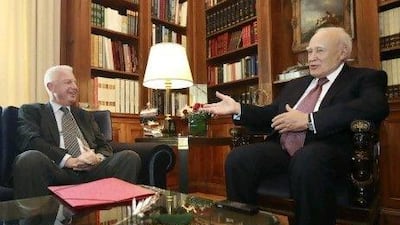BERLIN // Global concern about a break-up of the euro zone grew yesterday as markets slid and Greeks withdrew hundreds of millions of euros from banks on fears their country would be forced to quit the euro after next month's election.
The euro fell to a four-month low of US$1.27 yesterday at the prospect of deepening turmoil in Greece, which on Tuesday called for a repeat vote on June 17 after party leaders failed to form a government. A leftist party vowing to cancel the terms of an international aid package is expected to win, a result that could push the country towards bankruptcy and a euro exit.
The Greek president, Karolos Papoulias, warned of "fear that could develop into panic" among citizens in the weeks before the election. Greeks are withdrawing euros because they are afraid of a massive devaluation if the country leaves the single currency.
George Provopoulos, the head of Greece's Central bank, said savers withdrew at least €700 million (Dh3.3bn) on Monday, the Greek president told party chiefs according to minutes of his meetings with them.
"Mr Provopoulos told me there was no panic, but there was great fear that could develop into a panic," the minutes posted on the president's website said.
The president appointed a judge, Panagiotis Pikrammenos, as the caretaker prime minister yesterday.
A leading index of European shares fell to its lowest level this year and Spanish and Italian bond yields jumped on fears that Greece's departure might cause other heavily indebted European states to wobble.
The worsening crisis has led to speculation that the European Union and International Monetary Fund may soften the terms of the €130 billion Greek bailout. But Wolfgang Schäuble, the German finance minister, remained firm yesterday, saying there would be no renegotiation.
"The Greeks can't have their cake and eat it," Mr Schäuble told German radio. "There is no comfortable way to solve Greece's problems. If Greece wants to remain in the euro zone — and we all want that — then that is the path that can help Greece," he said, referring to continued reforms and austerity measures linked to the bailout.
Opinion polls show Greeks want to end the austerity but also remain in the euro, a promise made by Alexis Tsipras, the 37-year-old leader of the leftist Syriza party.
Syriza, which emerged as the second-strongest party in an election on May 6, is on track to become the biggest group in parliament on June 17, ahead of the centre-left and centre-right parties that negotiated the bailout.
EU officials are warning Greeks that they cannot abandon reforms and expect to remain in the euro zone.
The president of the European Commission, José Manuel Barroso, said the Greek people must be aware of the consequences of their vote.
"The ultimate resolve to stay in the euro area must come from Greece itself," Mr Barroso told a news conference.
Meanwhile there was continued uncertainty about the future of the French-German alliance, seen as key to tackling the crisis, after the German Chancellor Angela Merkel and France's new Socialist president, Francois Hollande,held their first meeting in Berlin on Tuesday.
The leaders were at pains to show unity and pledged to work together to find a joint approach in time for an EU summit next month.
But their body language showed that they were uncomfortable, with a stiff handshake replacing the kisses on the cheek that had been customary whenever Mrs Merkel met Mr Hollande's predecessor, Nicolas Sarkozy.
They could not conceal their differences on how to save the euro and pull the euro zone out of its economic downturn. Mr Hollande is seeking a greater focus on growth stimulus, while Mrs Merkel is insisting on continued austerity.
Mr Hollande repeated that he wants a renegotiation of budget discipline rules that Mrs Merkel and other EU leaders agreed to adopt earlier this year. He also mentioned the possibility of jointly issued so-called euro bonds as a way to shield countries from speculators — a taboo for Mrs Merkel, who has said the move would be premature and would increase German borrowing costs.
"I said it during my election campaign and I say it again now as president that I want to renegotiate what has been agreed to include a growth dimension," Mr Hollande told a news conference with Mrs Merkel.
Mr Hollande also made conciliatory comments towards Greece that appeared at odds with Germany's position, saying: "I do appreciate the suffering the Greek people are going through today. The Greeks should know that we will reach out to them through measures to support growth to allow them to remain in the euro zone."
David Cameron, the British prime minister, whose country is not a member of the euro zone, urged leaders to make greater efforts to save the currency.
"It either has to make up or it is looking at a potential break-up," Mr Cameron told parliament in London. "That is the choice they have to make, and it is a choice they cannot long put off."
foreign.desk@thenational.ae

